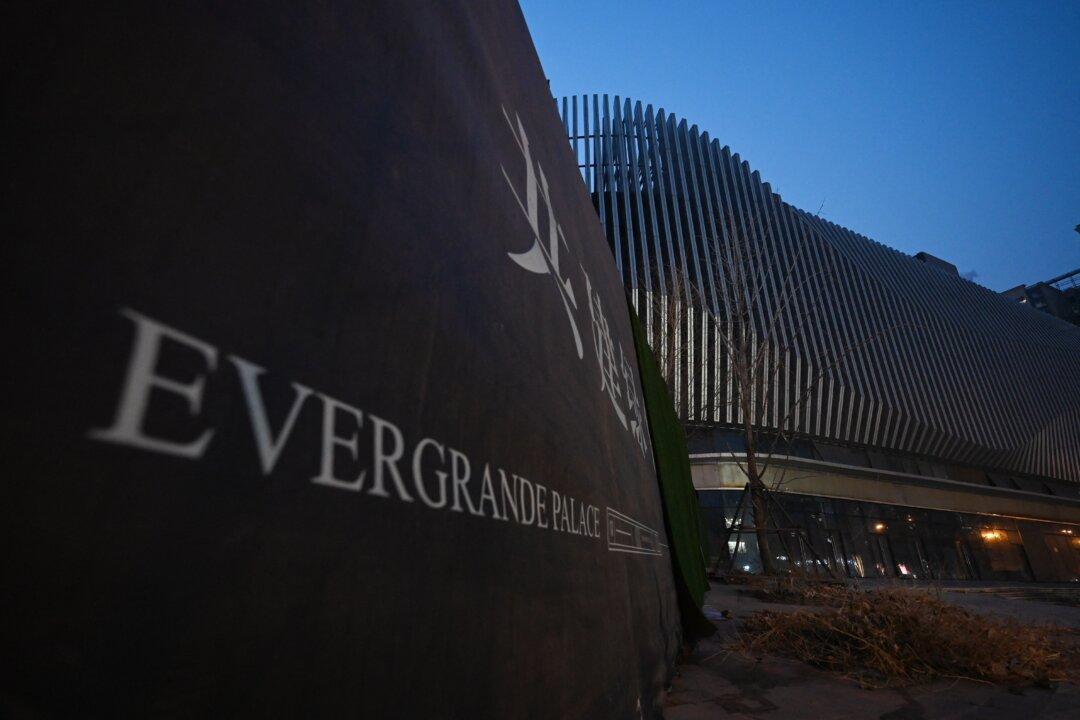Commentary
Over two years after China’s property giant, Evergrande, first missed bond coupon payments to its offshore creditors, including from the United States, a Hong Kong bankruptcy judge appointed a liquidator for the company.
The Jan. 29 ruling reportedly gives the liquidator rights to seize and sell the company’s assets, including onshore assets in mainland China. Those assets should then go to pay all creditors, including those from the United States.
However, history and the facts of the Evergrande case indicate that foreign creditors are already getting cheated again by the Chinese Communist Party (CCP).
The last two regimes in China dodged international creditors. Starting in 1938, the nationalists and then communists failed to pay China’s gold-denominated sovereign debt. Approximately 20,000 American bondholders, whose bonds are now worth over $1 trillion, are vainly agitating for repayment. The U.S. government has failed so far to help them much in Washington’s misguided attempt to smooth U.S.–China trade relations. Conversely, in 1987, the United Kingdom procured repayment for its citizens by threatening to cut China off entirely from London’s capital markets. It then went on to a cringeworthy “golden era” of UK–China relations.
More recently, in 2015, a property developer in China called Kaisa defaulted on what is now over $12 billion of offshore debt. Local governments in China renamed and confiscated Kaisa buildings rather than conduct an orderly bankruptcy procedure.
Naive U.S. creditors are forced to learn time and again the painful lesson that the CCP and the “private” companies it controls (arguably all of them in China) cannot be trusted to repay debts. The U.S. government allows its citizens to be swindled, most likely due to CCP influence in Washington, mostly mediated through corporations that make billions in China. Meanwhile, Washington continues to allow Beijing to exploit U.S. taxpayers by maintaining interest payments on the $850 billion we “owe” China.
Beijing already stopped a restructuring of Evergrande in September that might have treated international creditors more fairly. Instead, the CCP prioritized 5 million prepaid home buyers who have not yet gotten their homes, followed by onshore creditors. There will be little to nothing left for offshore creditors, especially unsecured bondholders.
The CCP is dodging international creditors by protecting Evergrande subsidiaries on the mainland, where the company has 90 percent of its assets. The Hong Kong ruling reportedly means that all Evergrande unpledged assets, including onshore assets, would be under the control of the liquidator. But the Evergrande CEO disputed this by calling his onshore subsidiaries “independent legal entities” distinct from that supposed other Evergrande that went bankrupt. That leaves only the unpledged portion of about 7 percent of Evergrande assets in Hong Kong de facto available to liquidators.
This is galling because Evergrande’s onshore subsidiaries continue to rake in cash. In the first half of 2023 alone, Evergrande sold $4.7 billion worth of units while not making international debt payments. The regime’s tawdry maneuver to protect a bankrupt company previously thought “too big to fail”—with little apparent concern for international creditors—will significantly decrease confidence in China. If Evergrande can fail, any Chinese company can.
Decreasing confidence is already priced into China’s falling stock markets, which, since a peak in 2021, lost approximately $6 trillion of its market cap. The China MSCI Index lost 60 percent of its value over that period.
Mistreating investors is not cheap, but neither is the CCP very smart.
The latest batch of unpaid creditors will impede access of China’s companies of all types to global capital markets and put another burden on China’s growth. That process has already begun, with global debt issuance for China reportedly falling from over $200 billion pre-pandemic to less than $45 billion in 2023.
The U.S. government and our allies should not allow CCP swindling to go without consequence. While bleeding-heart liberals may want to prioritize small-time homebuyers in China before international creditors, those homebuyers are also creditors and investors of a sort. Some of the international creditors are likely small-time themselves. It certainly would not be fair for China to again treat onshore better than offshore creditors.
But let’s be clear-eyed. This is their track record since 1938. Bold new offshore laws, such as in the United States, are needed to facilitate the repayment of Evergrande and Kaisa creditors by first, canceling U.S. sovereign debt to China, and second, imposing higher tariffs on China. These measures would also provide sufficient funds to repay U.S. creditors for the over $1 trillion in defaulted Chinese gold bonds and go partway to covering damages to U.S. citizens who lost loved ones to fentanyl and COVID-19 and who are therefore arguably owed trillions for CCP negligence. Reparations should also be made to American intellectual property holders who lose as much as $600 billion annually to China.
Now that the regime in Beijing has made clear that it sees the United States and its creditors as adversaries rather than trade partners to be treated fairly, there is no reason, if there ever was one, for America to keep taking it on the kisser.





